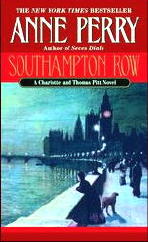Fri 14 Aug 2009
ANNE PERRY – Southampton Row. Ballantine; reprint paperback, Feb 2003. Hardcover edition: Ballantine, February 2002.
I probably haven’t thought enough about this yet, so there are probably any number of exceptions I’m not thinking of right now. But it’s treacherous ground for detective stories to get into, isn’t it, when the case to be solved in one novel is nothing more than a continuation of that begun (and not finished) in another?

Thomas Pitt supposedly thwarted Charles Voisey, the villain in The Whitechapel Conspiracy, the book in the series before this one, and here he is, acting up again. It doesn’t feel right. Detective novels are supposed to have some sort of closure, aren’t they?
Or perhaps I should take it back. Sherlock Holmes had his nemesis in Professor Moriarty, Bulldog Drummond had to battle Carl Peterson for several adventures, and Sax Rohmer’s Nayland Smith was constantly dueling if not outwitting Fu Manchu, and it obviously didn’t hurt the popularity of any one of those series.
But — as far as I can recall, and you tell me if I’m wrong — each of Holmes’ cases was self-contained, and except for the escape of the villain at the end, each of the Drummond and Fu Manchu books tied up the loose ends, and this one of Anne Perry’s, at least, doesn’t. At the book’s end, we still don’t know who the other hidden adversary is, an alienated member of the Voisey’s Inner Circle? And/or is he one of Pitt’s superiors? Could the corruption reach that high?
Epic science fiction sagas seem to come in trilogies — rightly or wrongly, blame it on Tolkien? — but it’s a little disconcerting to discover it in detective fiction. I’m relatively new to Perry’s work in general. Her stories of the Thomas and Charlotte Pitt seem to make up one long, extended Victorian drama, and you could say the same about the William Monk books as well. Which is all well and good, and Perry’s work is very popular. I understand the attraction, but when there’s no resolution to the mystery end of things, I (speaking for myself) start to feel uneasy.
In the case at hand — to get back to the review in progress — it takes a while for an actual murder to occur for Pitt to solve, that of a medium who may also be a blackmailer. Her death may also involve Voisey, and his attempt to run for Parliament.
Before that, and even afterward, there is a large amount of 19th century British politics to be expounded upon, and arguments about social justice and Home Rule for Ireland, either by the candidates themselves, or their wives. You may or may not find it all very interesting, but I got the strong impression that this is the story that Perry really wanted to tell, and it goes without saying (doesn’t it?) zeal and enthusiasm does matter.
As for the mystery, I noticed small glitches in the plot here and there. And while Anne Perry’s narrative technique often consists of characters mentally asking themselves all manner of questions, the questions I wanted to ask were almost never among them.
Charlotte has only a minor role this time. In a melodramatic finish Thomas solves the murder, but if he has the goods on Voisey on another matter — “a complicated scheme of personal revenge” — why does he let him go? I’m badly fuddled. It didn’t help to go back and read certain passages again. In fact I think it made matters worse. Befuddled, therefore, I remain, and bodaciously bemused.
[UPDATE] 08-14-09. Before reprinting this review (which may not have actually appeared anywhere else until now), I confess I looked at the comments posted on Amazon, and I discovered that I was not alone in being put off balance by coming in at the middle and not having read the previous book in what’s now apparently a small “arc” in the overall Pitt series.
It didn’t bother regular readers of the series, however, of which there are many. I’ve read (but not reviewed) only one other of Thomas and Charlotte Pitt’s adventures, the title of which I no longer recall.
Earlier on this blog, though, you can read my comments here on Funeral in Blue, a case for William Monk, another book which, unfortunately, I also found disappointing.
August 14th, 2009 at 9:41 pm
The serialized mystery is becoming more popular in the genre, with carry over plots and cliff hangers appearing in many books now. Fine if you plan to read all the books, but not good for those of us who may want to dip in and try the water. We may have to live with it though. Guess we are back to the Victorian serialized novel, the return of the triple decker.
And I suppose if you are going to mention Anne Perry someone has to mention that she was Juliet Hulme, one of the two teen age girls convicted in the infamous New Zealand murder of one of their mothers dramatized in the film Heavenly Creatures (I can’t remember if Kate Winslet played Hulme or not in the film — guess someone can check IMDB). And since you reference Tolkien, we come full circle since Lord of the Rings director Peter Jackson directed Heavenly Creatures.
August 17th, 2009 at 1:12 pm
My wife has often expressed her devotion to the Anne Perry books, and she resolutely refuses to see HEAVENLY CREATURES.
August 17th, 2009 at 9:20 pm
[…] the other hand [speaking recently about one of Anne Perry’s books], if you happen to discover a sense of continuity between one […]